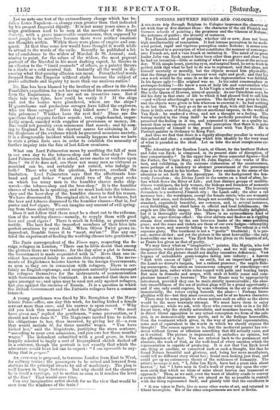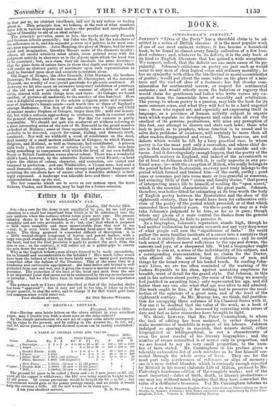NOTIONS, BETWEEN BRUGES AND C0L0Gbrje,. ;
A six-nlys trip. through Belgium to Cologne impresses the obrierVer of art with four or • five-distinct ideas : the Character of the old Flemish and German schools of painting ;. the greatness:And the vileness of Bebens ; the nuisance of guides ; the atrocity of restorers. The Flemish school of painting,.. whether old or new, does not boast high intellectuality of conception. It had intense perception in ittimedi, revel period, rapid ' and vigorous perception under .Rubens ; it rieents'ncivr to be reduced to a perception of -whateoustitutes the manner of contdrapa. rary French-art, and.a vain knack at imitating it. 'The mind of its great leader John van .Eyck cannot haveheemother than grave 'end clear ;,but he bad no invention—little. or.nothingOf what we-call ideas at the present day.. With simple heart, piercing eyes, and Magical band, be set to work in perfect faith that what he had to d.o.was to represent, and that alone, not himself mentally or morally, but the,objects around him physicallY; that the things given' him to represent were right and good; and that his own work would be the same in an far- as the representation •was•faitlifilt Is his figure ugly ?—His original ,was so. Is big saint commonplace or grotesque-looking ?—He knew a man of holy life ,and ecinvereation'who was grotesque or commonplace.. Is hisVirgin,a'noble maid or matron She is the Queen of Heaven, arrayed queenly:. As our Catechism says; he did his duty in that state. . life _to which it had pleased, God to call Cif —and, without afterthought or question. The faculty was given to and. the objects were.given to him Whereon,to-exereisci it ; he had nothing to.do but that. 'We may go so.far as to say that;ieith-still less' thought, there is little even of feeling, of direct:enietionalinipreas; in the works Of v.a. Eyck he rendered a thing, and not a thought Or a feeling. 'The feeling resided in the thing itself: he who 'iperfeetly perceited the thing perceive& the feeling in it too, and. expressed-it rather as a quality in- herent than as an emotion evoked. The.pereeptien-that there it is quite independently of _himself it the grand.- point-with Van Eyck. He is
Portrait-painter in.Ordinary to King•Fact.' ,:••- - • • • •
And thus we find that there is edignityliltogether peculiar in works of this.school and class ; It something which hits ideality by the very -went of what is paraded as the ideal. .Let us take thelmost conspicuous-ex- ample. The Adoration of the Spotless Lamb, at Ghent, by the brothers.Hubert and John van Eyck, is composed, in Represent 'state of disruption, Of four compartments.* In the upper line are three separated figures—God the Father, the Virgin Mary, and St John Baptist,=the 'works Of -Hu, bert, and exhibiting, in the extreme'elaboration of the countenances, more perhaps of a tendency to abstract presentment of the personageS than is to be found in his brother. The lower section is the Beene of the adoration as set forth in the Apocalypse. In the-background the hea- venly Jerusalem ; the Divine Lamb in the.centre-ou a kind of altar, _be- fore which flows the River of Life; and four distinct groups of multitu- dinous worshipers, the holy women, the bishops and founders of monastic orders, and the saints of the Old and New Dispensations. The heavenly Jerusalem is a mediaeval. Flemish city ; ;the Land) eddi the altar a red morocco box ; the worehipers, except thafemale saints,-who are womanly in the best sense, and therefore, though not according to the conventional standard, exquisitely beautiful, are common, and, in several instances even forbidding,. and stand laden in_ official .and loeal habilimedta;--Als; angels are like little images. The landecape, is indeaciibably delightful, but it is thoroughly_ earthly also. :There is no extraordinary,kind of light, no super-terrene effect : the river shivers and flashes-Its-a rippling stream does smitten by the sun between banks of the same perishing grass; and the roses and violets are those of our ownledgee—attempting to be no snore, and scarcely failing to baits-ninth. • The eolour a rich supreme glory. The treatment is not a 4‘ poetic" treatment ; it is pro- saic, matter-of-fact: and yet the picture is the most heavenlike—the Only heavenlike one we kilo*. Van Eyck has here given us the heaven of art, as'Dante has given us that of poetry.. . . . We may fancy what an "imaginative " 'painter, like Martin, who had imagination, would have done for the subject;. and we will suppose for the nonce that the picture should net display executive-deficiency. Vast leagues of unbialdable genii-temples fading into infinity ; a heaven " dark with excess of light" ; no earth, but an improvised geology ; the Lamb no drover's bargain, but a radiant presence; the angels flan- ing,messengers ; the saints an innumerous company of sonietliings—not downright men, rather white robes topped with_ palm and bearing harps. But • men in darnaski and sergcs, with snub or bottle noses and com- pleximits tanned !—ye heavens ! The four Beasts may be appropriatelY introduced, provided they can, be, made strictly inconceivable ; the.absoe lute unearthliness of the sea Of Molten glass will be a grand opportunity; and if one only could express, by some vibration in the air or otherwise immaterially, the voices crying beneath, the altar— ! Perhaps' hiero- glyphics will do—but they must coruscate, andle of no known character.
There may be some people to whose notions such an affair as the above
would be the more heavenly attempt. We must leave them to enjoy their opinion; while we ask, with those who concur with us in a far dif- ferent view, why the strictly, naturalistic and mundane heaven, which is in direct literal opposition to any actual conception we form of the sub-. jec4 is so immeasurably more poetic, and to the feelings heavenlike,
i
than the treatment which gives, in the way of pictorial representatiOn, some sort of equivalent to the words in -which we should express the thought ? The reason appears to be, that the mediaeval painter has ren- dered without favour or affection something that did actually exist, and as it existed. The picture is impersonal; it embodies no opinion, but the affirmation of a fact. You are referred back to the permanent and absolute, the work of God, as the well-head of every emotion which the representation is capable of producing. It is not that Van Eyck loved one thing or another, or conceived such or such a thought, but that he found Nature beautiful and glorious, and, being her mere mouthpiece, 'could tell no different story about her ; found men looking just thus, and could get up no extraneous theory of The nobleness of humanity. The artist's message is not, " I, John van Eyck, have had a great idea about heaven" ; but " I have seen in God's work of every day upon the com- mon earth that which no ideas of mine about heaven can transcend or approach." Thus, as we said, even the -want of ideality avails to convey a certain ideal impression. We are placed as far as possible in contact with the thing represented itself, and plainly told that the excellence is
* It was taken to Paris, like so many other works of art, and returned to Ghent incomplete. Six of the other compartments are now at Berlin.
in that per se, an -abbtlett e ellence and' nit in'aliy notion or feeling about it. , This .priapipla.lie;•Ive-lieu, at the, root of what numbers have felt in various degrees and •niodess—tho peculiar and unrepinceable
value of literality. in -aid of an? ideal. subject. • •
The principle pervades-- more or less,-.:the works-of the early Flemish and German scheelageneritlly,;', "bit John:van; Byek, for the nakedness of his edhereece-tait, and his supnethelpowers-ns a panter, is its most eon- s:ph:Imes representative. John Memlingithe glory of Bruges, had far more mind and imagination,. Quentyn.Maseys :more of the dramatic faculty; others,: all candid - adruieers. roust adniit,..ciften painted away with the judgment entirely in abeyance- as to the objects amen which the hand was to be.exereieed; huh-. ac a class, 'they all inculcate the same doctrine- tbat the plain filets of nature:have in them that depth and divinity which will confer an abstract. purity of sentirnent: upon such,' representation' as shall be founded upon clear and eceinateperpeption alone. "
Old Roger of. -*egos,• the elder Granule: John Mostaert, the brothers
Dunwege, Nes,' and, the anonymous St,,Ohristopher„ at the Antwerp Museum, are worthy of .entri special- gratitude 'for effeasiasezonforrod. At Antwelp we hit also_upon:an:extensivetempormy exhibition of paintings of the •eld -aed.,new sehoolej,tendiall manner of --objects of art and virW, .sterred with :noble thingslhere• andithere. At Cologae we found another, of pictures all etediieval; to the ittiniher of' fivellemdred • Here was a delightful, experience-ill the: solemn religious grace 'and womanli- ness of Amborger's fenthesaints--eath worth' two. or three•of: Raphael's average Madonnas. leolleetion -was' a Virgin and Child of ancient master, Stephan: of .flologne, larger thairli fe ; :mild and beauti- ful, but_with aeoftnesemptaemehing to weaknest, , Muck in-Contrast with the general ellaractertaties,of the' age. ':For this.' the- restorer is partly respoeMble... We-should Mot...quitethb,:mediseval art without- referring to a mostinteresting series theaotiflef St. •Romnald in the grand massive cathedral of Al leme.ofrthem espeeially, where's different hand is probably to be detected, superb for coloia, :feeling,- and dramatic truth, combined. . or will-,we withhold a word of-condolence en the dead, dead inenity.of .a sMall-modern exhibitien:ne.Cologne, to which France, Belgiune and.Holland, as well as Gerinanyihad•iontributed. A piteous sight truly ; the utter inertia of artistic faculty in the little men here being something` in' coMparison with which- the levet • of our own Suffolk Street or British Institution seems almost robed. There was a wonderful child's head,' however, by-the admirable: Parisian' artistRicard,a head where the claims of colour,' charieter,eand execution, :are united and balanced to perfection and one Waldnaiiller, a Vienna man, had sent a small domestic cubject5 inwhich :that strange and poignant happiness of revisiting the out-doors-face of nature after a deathlike 'sickness is feel- ingly expressed.. A landscape was ,tederable here and there : silence and
commiseration sum up the rest. '
The few remarks which are -to -serve as our •• sermon upon the texts. Ruben; Guides, and Restorers, may be'kept,for a future occasion.

























 Previous page
Previous page